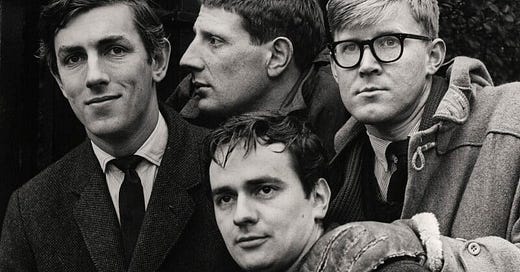Pop Music = Comedy, and vice versa
My love for pop and my love for comedy seem like the same thing. How about you?
When I was a young man doing publicity for Barry Trotter, I’d often say quite truthfully, “I only became a comedy writer because The Beatles weren’t hiring.” This may seem like a strange thing to say—I don’t think many 32-year-olds today consider the two fields adjacent, much less the same thing. But for a time, a generation or so, music and comedy were joined at the hip.
I’m not talking about both being tentacles of the showbiz cephalopod, and even less about Del-style improv’s straining to generate rockshow-style excitement for every random Harold on a Tuesday in February. (“Step one: pick a raucous song. Step two: play it VERY LOUDLY as the troupe runs up the center aisle clapping and hooting. Step three: try to ignore the bowling alley downstairs.”) I’m talking about when rock and comedy felt like they were being made by the same kinds of people, for the same kinds of intelligent, sexy, anarchic ends, and were enjoyed by one audience. How Christopher Guest probably could’ve been a rock star, but chose to do this instead.
If you simply stack data, it’s inescapable: the heavies of comedy and rock and roll rubbed shoulders for at least twenty years, and not just at coke-fueled parties in the Hollywood Hills. There was a conversation going on between the two arts. (For example: this sketch from 1976.) This meant that all of us who began fanatical about one, likely developed a taste for the other; in a simple example, I was introduced to Beyond the Fringe via reading about The Beatles.
George Harrison himself famously stated that the spirit of The Beatles went into Monty Python. (Maybe a jot of that spirit was returned—with interest—in 1978, when John Lennon passed Neil Innes on the street and began humming “Cheese and Onions.”) Sometimes the influence went one way—The Goons’ influence on The Beatles’ playfulness in interviews, or A Hard Day’s Night being directed by the same fellow, Richard Lester, who helped create The Running Jumping Standing Still Film with Sellers—and sometimes it went the other, as when Zep the Stones and The Who helped spread the samizdat popularity of Derek and Clive, or when Harrison mortgaged his house to fund Life of Brian. SNL itself was born at the confluence of comedy and pop, a cultural nexus that really doesn’t exist anymore. The one and only Python/SNL collab was “All You Need Is Cash.” With something like This is Spinal Tap, where does the comedy end and pop music begin? I was not surprised when I learned that Conan O’Brien plays rock guitar; even less so that he was heading up a lot of the U.S. publicity for Macca’s latest book—I’m sure Conan would also say, “I did comedy because The Beatles weren’t hiring.”
There is a book here, and maybe I’ll write it; now that I’ve shuttered my Beatles blog (at one point the largest Beatles fan site on the internet), I do need an outlet for these kinds of thoughts. Peter Sellers wasn’t the Fifth Beatle, but he has solid bonafides for being the Twenty Fifth. I don’t exactly know why humor and rock and roll seemed to tarry together for more than a decade, and I’d be interested to figure out how and why their paths diverged. But for a generation or two, it sure seemed like the same thing. Was it this way for you? Or nah? Answer in the poll.






I guess my answer is "no" with shades of "I don't actually understand the question." Like, my primary relationship to The Beatles is with their music, not their personas, and I don't really see any connection between my love of comedy and "Rain" or "Long Long Long." I guess you could say that pop music is always partly about personas -- fine, then are we just talking about interviews and music videos?
OK but it is fun to think about intersections between comedy and music, and as Jeremy S. says The Best Show is a great place to start. Anyone who hasn't listened to Jon Wurster and Tom Sharpling do Rock, Rot, & Rule should really do so:
https://www.youtube.com/watch?v=MvABt2uXRzY
And after that, they should treat themselves to his work drumming for The Mountain Goats:
https://www.youtube.com/watch?v=FEybmg4afoM&list=PLS4jAfE9d3aIppBgzhWBp1KTiAACcNY83&index=3
But the other place to look in 2023 is in the world of hip hop. I mean, you literally have The Roots on Fallon, but you also have Dave Chapelle's Block Party where Kanye, The Roots, Mos Def (of Hitchhiker's Guide) all hang out with Chapelle. Remember the sketch with John Mayer and Questlove?
So, why? Pop music has at times trended towards lyrical self-expression. The Beatles obviously were pioneers in that department, and hip hop carries that torch today. Maybe there's a natural connection between that and comedians who against a background of homogeneity manage to put their sensibilities forward.
By the way, you've also got Father John Misty who seems at times to be doing an extended bit and also titled his album Pure Comedy, and when I saw Titus Andronicus last year Stickles stopped the show to do a long homage to Cheers with like props and everything. But what I'll say is this, when I go to standup I sit there and laugh, and when I go to a rock show I scream and shout, and those are really different ways of feeling IMO.
Agreed! Moore’s is no stranger than any Lou Christie hit, and Cook’s is truly weird and great, the highlight of the film for me.
Peter Cook apparently craved stardom as an Elvis-like pop star but—in a rare example of the fairness of the Gods—couldn’t carry a tune. (According to Dudley, at least.)